Daniel Cuervonegro's Blog
July 24, 2023
Thoughts on Fantasy #3

Dune's Oneness
What is Dune? A recollection of the human heart and its frailties. A story that exposes the weakness of the individual and the danger of the masses. A book, a series, two films, and a wish to show the realist side of our history told backwards and into the future. I would like, however, to explore something else about this already well-examined saga. The oneness it proposes and our grave, albeit, unlikely path towards it.
Herbert was a realist who used epic storytelling to explore the dangers of messianism in his time. A child of the long twentieth century, he had the influx of WWII and Totalitarianism to serve as the canvas for the exploration of idolatry, religion, and the way the future is a mirror to our past. As was it shall be, he seems to tell us, since religion, more than secularism and reason, overtake all institutions. A holy massacre is but the beginning of a perfected one-nation galaxy, where a single tribe and its pre-modern likeness reigns. When all creatures of humanity are alike, when they share beliefs, especially the intangible mythos that can whisper of the future, then a peace will settle. Or so they say.
Alas, the great massacres to lead us there are reminiscent of our past. A time when every warlord was a priest and every priest a foreteller, vying for the oneness in their peoples that could finally bring peace. In the end, even the most adamant warrior spoke for the subtle intricacies of their religious interests. This is what, Herbert tells us, will be our future. Even out there, in space or upon a ship of science-parts and reason, religion will usurp our spirituality and lead us into the desires of the One Tribe. Guided by great purpose and thereby the messianic single-minded leadership so devastating in the likes of Putin today, we will be united only by our tribal sense of pre-modern likeness. Instinctively, he tells us, we will strive for such comfort and deem the sacrifice of others an easy and most worthy step. This is the danger that Dune speaks of, to think in oneness. One leader, one people, one culture, one belief, one purpose.
The multiplicity of choices, the great ocean of possibilities in which our human mind swims, becomes limited. The sea is made a river and it flows in one direction. Try as we must, the flow carries us, guide us and takes us down, and always down. And here I disagree with Herbert, genius as he is.
Some believe, and therefore explain, that science takes from religion in its discourse and purpose. They say that science, especially science fiction, is religious in its language, in its design, and most of all, in its ultimate conclusions. Dune explores this, and Herbert might seem to agree, that scientific discovery follows a religious vein of wonder. That despite its merits, science functions on the whims of a sense of spiritual desire inherent to our being. Because of this, ultimately, the greatest achievements of science are but means for better, truer, achievements of the religious kind to take effect.
But science does not take from religion neither in form or purpose. Religion takes from science. It is, if anything, the history of our failed sciences, compiled in magnificent books and tales, stories like any other but that tried, sincerely, to find the meaning of things. Its scientific basis is what makes religion so dear to our hearts, so useful in the absence of answers. For the primitive mind it was a key to unlock the secrets of the world. And the world, vast as it is, remains mostly unexplained. This makes our minds, in the shadow of all doubts, still entirely primitive. Primordial, I would say. And so it remains. The ever receding god of the gaps is the comfort we have for the time between ignorance and discovery. And so I believe Frank Herbert's Dune presents us with a vision of a future too much like our past. And so, in my opinion, he errs.
The future science creates is akin to the future religion made for us. For, if religion is the first of our sciences, the compilation of our failures in a slow process of improvement, then all we can expect is that, as this science once dubbed religion continues to guide us.
With every question answered, the religious explanation humbly moves back into the realm of myth, of error, and of mankind's humble stumblings. Whether believers are angered or not at science does not matter in the long run. The beauty of the mind is its adaptability. Science, the true purpose of religion, takes precedent because it work beyond human ego. With it we shall reach new heights of human kindness, communion, and transcendence. Not in the sight of mythical propositions such as heaven or the afterlife, Nirvana or the enlightenment, things we instinctively long for, but somewhere else. Here, in this world and this world only.
Dune tells us that religion will unify us and bring peace after a great genocide of peoples and cultures. After the great Oneness is achieved. I say religion will remain as long as there are questions in the universe and it will survive by the side, and thanks to, the efforts of its greatest of friends, its brother, and second face, Science. For if anything allows for the survival of many religions, rather than just one, is science and its multiplicity of approaches to the search for truth. Herbert's Dune proposes a world united and therefore lost. I see the bond between our human natures: One our desire to dream and do it so vastly and beautifully, we try for the heights of gods and heavens. Two, our ever present longing to know and reveal, and discover through or naturally given talent for science. To find, more than anything, the truth.
Together these two powers be bear will reveal the world, one keeping us warm in the cold, while the other guides us through the darkness.
May 16, 2023
Thoughts on Fantasy #2
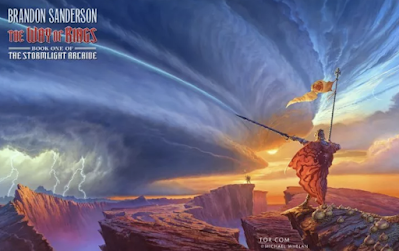 The Storms of Brandon SandersonDalinar Kholin, Highprince of Alethia, the Blackthorn, reaper of the battlefield, exchanges a priceless sword for a band of tired and worthless Bridgemen. He gives little thought to it and declares the worth of his honour as unmatched by anything under the sky. Who is this knight Brandon Sanderson brings to us in the pages of his colossal books? No more is he the racist Highprince, the killer, the un-disgusted warrior who can't lose an appetite even as the scent of blood mires fork and knife. He's our moral guide in a world where honour is proclaimed to be dead. And as many things that die, honour and Dalinar are made better in rebirth.
The Storms of Brandon SandersonDalinar Kholin, Highprince of Alethia, the Blackthorn, reaper of the battlefield, exchanges a priceless sword for a band of tired and worthless Bridgemen. He gives little thought to it and declares the worth of his honour as unmatched by anything under the sky. Who is this knight Brandon Sanderson brings to us in the pages of his colossal books? No more is he the racist Highprince, the killer, the un-disgusted warrior who can't lose an appetite even as the scent of blood mires fork and knife. He's our moral guide in a world where honour is proclaimed to be dead. And as many things that die, honour and Dalinar are made better in rebirth.Honour is brought back, no longer latched to the tit of culture but given new life in the moral decisions of an individual prone to loss and suffering. And for Dalinar, his rebirth comes with revelations to a conscience once lost, now found. What he did to his wife, to the people of his world, and to himself in those years of valiant cultural ordeals, cannot be repaid. Knowing this is his rebirth. The awakening of his true conscience, and the rise of a moral man where once there lay only brute immaturity. But there's more to this from an outsider's perspective. There's more to the enfeebled reader of post-Cold War South America, where proxy wars were unfought yet left thousands in the dirt. Where leaders were killed for ideas in their seedling shells. There's more, for the rest of the world too, and especially for those isles we call japan, where not one but two bombs were dropped.
One could argue back and forth about the merits of military action in a state of war. Just wars are also justified wars; actions within blessed by merit of what they prevent. War is easy to justify when we cannot know the outcomes either way. And so we argue. Just like our politicians and, more to the point, our heroes. And Dalinar certainly is both. He must have justified his actions. Given his intellect, he surely could. But, after all that's happened, I'm not sure he would. I think his silence on the matter of his crimes is telling. Like America, the great America that will not call itself an empire, and that dropped the bombs, and waged the proxy wars, and neo-colonised the new economic colonies of Latin America, he remains quiet, hoping his rebirth is enough to have cleansed the past and forge a new man. A moral man.
This, I believe, is one of the storms of Brandon Sanderson. And like all storms, there are secrets behind the eyewall. Like the governments in turn for the blaming, we cannot fully respect or even like Dalinar Kholin. Who could? He was a monster of the battlefield, but not merely a soldier with a soldier's goals. He was merciless, even to those he ought to serve and protect, he was cruel to children, a genocidal pre-modern utilitarian warlord. And just like Sanderson's America, he dropped bombs when needed. He dropped them because others would have done so as well. He, it, would act in this immoral way because everyone else also would, and therein rests the black of the argument. The Hobbessian Trap springs and suddenly we're caught between our judgement of the man, the government and the empire from the privilege of hindsight in an age of relative peace. We ought to say it was right because it was less wrong. Even more, we ought to say it's right because it has changed. The Empire, like the hero, no longer sheds innocent blood. It avoids battlefields, it helps allies, it wants to talk when others want to fight. It, he, is better now.
The storm grows, however. We are no longer a people to justify violences of any sort. We are no longer a people to forget our past. Our modern world turns deeper and deeper into the consequences of memory and history. We seek a way to right the wrongs of a recent past where honour was widely spoken of but was most certainly dead. For this, we have created our own form of honour, and in some cases even enjoyed using it to judge the past. Judge it harshly. We don't want to forget. We don't want the perpetrators to forget, since the victims can't. We want history to live today, to impregnate even the children with the sins of their fathers...
Right?I'm not so sure. If Dalinar, the genocidal hero, can have a rebirth, can I? Can we?
I believe Sanderson's Stormlight Archive is just that, a story about the light we find in the storm —sometimes cruel and deadly, sometimes sublime and beautiful— of an archive. Of the past. The United States of America dropped two bombs. Yes. It created proxy wars and neoliberalised the weak economies of as many countries as it could. Like Dalinar's, there is no justifying these deeds. But can it be reborn? Is this the wish of its people? Of its kindest and humblest and greatest people?
I'm just a humble fantasy writer, unlikely to ever meet Brandon Sanderson. I'll never have a chat with him or know who he is truly. I'll never have the extra money to pay him a visit in one of his many conventions or get a signed book. I know only what articles and booktubers will say of him, for better or worse, and I have a feeling, a very strong feeling, that he's a wonderful guy. And this what this all comes to. He's a good guy writing about a monster, wanting us to like him. And isn't that the dream of all Americans? Isn't that the storm of all Americans? After all that has happened, don't they, too, just want to be liked? Don't they, like honour and a monster, have the right of rebirth?
April 7, 2023
Thoughts on Fantasy #1
 The Lions of Guy Gavriel Kay
The Lions of Guy Gavriel KayWhen I finished reading The Lions of Al-Rassan I realised, to my surprise, that I had just read one of the most powerful and impactful fantasy stories ever written. Recently, I heard a panel with various wonderful fantasy authors, amongst them Aleron Kong, Jim Butcher, Brandon Sanderson, and Marie Brennan, in which they agreed wholeheartedly that magic was the heart of fantasy. They spoke of several nuances, and even though they did not mention the Lions of Al-Rassan and were mostly trying to be funny, they wisely hinted at the fact that fantasy, in all its glorious diversity, is truly about the magic, but not the spells. It’s about the fantastic in spirit and the wondrous at heart. It’s about how to bestow a sense of ultimate purpose on the reader, even as this life sometimes seems to offer the opposite. It’s not about hard or soft magic systems, simple or complex spells, deep explanations of the origins of wonder and the bizarre, or even the mystery of the arcane. It’s not about the creative makeup we put over the face of our stories, like pretty masks and it’s not about the differences between our world and those worlds we deem so distant.
I believe, and I say this with the utmost humility, that literature is the only way to truly embark on expeditions of the conscience. It is an undertaking we are yet to equal and the one cultural trait (privilege, I must say) that we all share. There is danger in it. A journey into fiction may burden or lighten the soul. An odyssey across worlds will come at great sacrifice and yet bear great treasure. And herein lies the magic at the heart of it. It uses our imagination to express, exalt, brighten, and ennoble our human character, for there is nothing about it that is false. As an expedition, it is the most revitalising. As an accomplishment of the human will and its creativity, it stands at the zenith. Literature is not our world, but it is based on it, and like all mirrors, it may be flawed. What we find in the faults, I would like to think, may perhaps add to a more complete version of ourselves.
All literature is wonder, and if Lions of Al-Rassan, with its hint of magic hidden in the beauty of a landscape instead of the spell at a foe’s fingertips, is fantasy, then everything is. And that’s a nice thought to have. I regard this book as one of the greatest fantasy epics, a great journey of understanding into the heart of literature and the spaces where genres blend. With books like this, fiction and fantasy are revealed faces of a single soul we all share. So if ever there was doubt in a reader’s mind as to where to start with fantasy, how to reach Tolkien and Martin and Hobb and Sanderson and Leguin and Gaiman, and all the others, I would say Guy Gavriel Kay and his Lions of Al-Rassan.
April 6, 2023
Profile: Alicia Aeris Harrin, the Soldier
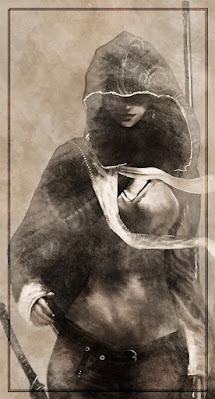
Alicia Aeris Harrin, Erelim of Damaria and the House of Liester, is a Beautiful One. These Burnt ones are touched in body but not soul by the Fire of God. Despite their incredible presence, their sexual allure, and the wonder of their perfect features, they find little reason to live. Bound to a dark nihilist contemplation of the ever-fading world, Alicia manages to safeguard herself from self-destruction by finding new and better reasons to live. However, as the world intrudes on her intentions for a life worth having, she finds this harder and harder to do. In The Atlas of Dreams, she will find motives for both, continuing and, perhaps, ending it all. Sins of the Maker, episode one of the saga, explores how one like her can find hope even in the darkest of corners or the direst of circumstances.
December 9, 2022
Profile: Vangelis Ormus, the Messiah
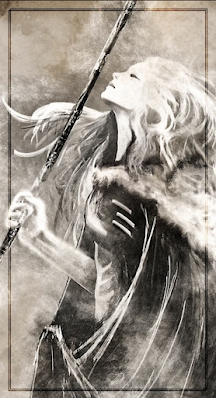
The last heir of the Theocratic line that once ruled the Realm, he now looks for God's forgiveness in a quest for understanding and redemption. As the remaining member of the outcast family of Ormus, Van can no longer live in the City. He endures a peripheral existence in that region of all Gardens called the Forest. This is no regular landscape but a place ruled by the Erelia: the Animal Spirits. Here no men live in peace but at the mercy of the beasts. Here man is the weakling's soul in need of solace from the elements, from the sun and the rain, from the heat and the cold. He is the one that learns or dies.
Van was forced into this condition by his own sense of transcendental death but now finds himself caught in a prophecy where the merits of his millennial bloodline can finally be at rest. Once the heir of the line of Archons that rules the very heart of the world, the City of God, Van may wander into a path of conquest or peace. But there's the weight of memetic legacies to consider, to drive him through it and prove his will a mere mechanism of the group-thoughts that make or break a civilisation.
December 7, 2022
Profile: Aldemar Belshazar, Lord General of the Sil Order
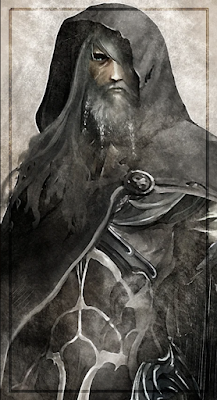
The Lord General of the Sil Order, Guardians of God. They are sworn to protect her at all costs, even as madmen rise against the very preserver of life.
The Sil is an Order of knights focused on God's protection, but it's not merely through strength and valour that they attempt this near-impossible feat. They are masters of the Fate Arts, the memetic draw of accrued knowledge in the great history of mankind. By taping into the complete history of their eonian species, the Sil are capable of predicting, with great accuracy, their opponents' archetypes and most plausible reactions to stimuli; thus being capable of facing even the fastest and strongest opponent with ease.
By touching on the memetic history of humanity, they also get to learn from it, not merely holding a sword with the practice and proficiency of a trained knight, but with the inherited teachings of all those who, at some point, held a weapon and faced an opponent. With the cumulative learning of the species by their side, and the various Arts they can use in their favour, the Sil have never before been defeated and thus God has remained on her throne and at peace, for the greater glory of mankind.
December 6, 2022
Profile: Shaii the Wanderer, Slayer of God
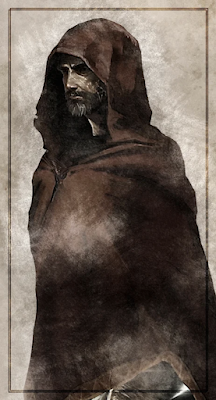
A man that has lost everything and has been given the power to do anything. He embarks on a quest to slay God and those who serve her. In his pain he finds nothing but the drive to see the world undone; a collapse of all structures that uphold the state of things in a hierarchy of oppressive powers.
Shaii wonders often about his role in the world. As the bearer of incredible power, he lives in the liminal spaces that shape the choices of men, reflecting upon the origins of moral behavior and whether there are reasons in a cruel world to be anything but indifferent. Begotten to his wandering quest by the search for an absolute morality and a theocracy that remains unresolved, he vies between his desire to undo everything and his hopes of finding a measure of meaning in a meaningless world.
Still, he clings to hope, searching for those moments of true humanity where hearts may meet and where the overwhelming nothingness of life is redeemed. To an Exile like him, to an atheist, these moments are scarce, and so his anguish and his pain persist as loyal followers in his journey across Solaria. With only his daughter's dog to keep him company, he moves from one value of darkness to another of light, always leaning towards the evil he feels the world has robed him with, and giving it back to those deserving. A true antagonist of life itself, Shaii seeks but fails to find the good of things, and so his heart turns darker still, and with every passing day, crueler even than those who took it all from him.
November 8, 2022
Profile: Caelestis Adolf Belshazar; the Saviour of God
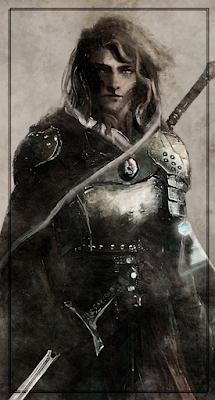
Second Son of the Belshazar Clan: An atheist at heart, Caelestis searches for purpose on his own terms and fights the religious morality of his age with stern silence and humble obedience to his cruel master. A knight in training, if he succeeds he will become an Erelim Sil, a Guardian of God.
Having lost his mother and lived far from his father, Caelestis wants nothing but to reconnect to the very things he believes matter the most. In search of his creators, both genetic and memetic, he finds a great emptiness of meaning, a deep well from which he may never rise unless he learns to define himself and the value of the world. In a world where God is reachable, where you can see her, hear her, touch her, if you're fortunate, he decides to deny her. He proclaims to his most inner self that there is no god, for there's no supremacy of the kind. He seeks now to understand what a man without a maker can be in the world, what he can create to make the world a better place, and what he can learn from this replacement of the highest power. If there's no god, then I'll be like a god and make this world as intended. He, more than most, faces the reality of a maker's sin, the very title of the book, as he faces the ways in which we make ourselves through our deeds.
October 17, 2022
Profile: Sara the Thirty-fourth
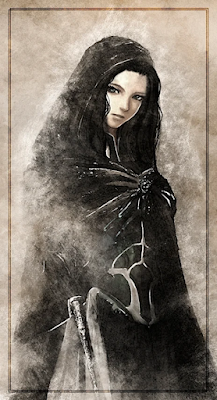
The Thirty-fourth incarnation of God. In her hands rests the energy to preserve life and to keep the stars warm in an old and cold universe.
Sara is not just the thirty-fourth incarnation of God, she's also the smartest person alive, with a mathematical mind beyond any ever seen in the history of mankind. She's capable of calculating the consequential iterations of the most complex memetic codes in the greater history of the species, accounting for billions upon billions of years and trillions of potential results. Still, Sara remains mostly unaware of her capacities and the implications of what she can reveal by gaining contact with the Seed of Foundation, the accumulated memory of humanity across time.
October 11, 2022
Prologue to The Atlas of Dreams – Sins of the Maker

“So begins the story of the cosmic hunt. Of how we tried to kill the beast and stop the sun from dying out, and of how we learned that those who wish to make light must accept burning things up.”
Prologue
Ve cambiar el mundo a tus
pies sabiendo quién eres.
Cierra tus ojos solo para
soñar y reír y llorar.
In all things I felt the passion for power and change, the drama of endless creation through destruction, a theatre of birth and renewal, of love and sacrifice, of death in the name of the perpetuation of life. I came to think of myself, not as a wind of atoms, chaotically whispering through time, but as an almost insignificant part of that majestic process we call existence. I experienced a sense of grief followed by overwhelming joy and felt reconciled with mortality knowing that whatever I am would survive enshrined in a better shape, a new body with a greater purpose, and that my little worth, trivial under the vastness of the sky, would somehow be preserved in the heritage of gods and men. In a real way, the sadness, sorrow and longing of life, the cycle of suffering that oppresses us all, was lifted from me and, where I had seen omnipresent death, I saw now everywhere the vast and glorious triumph of life.
I said yes. We said yes. Yes to life. Yes to a return to the moment of beginning and the dream of one day being as Gods. Yes to the vote of all life to remain living by dying.
This is the story of that vote. Of that choice, to endure and conquer time through the merits of death and the voices of all who live and have lived. And it begins in a simple house where three lived, sharing their memories and dreams. The father was the first to die. Then the mother. Their deaths were necessary. And the baby’s. But she should live. She had to, for a hundred years this baby should live. And while she remained safe in her palace above the clouds all would be good with the world.
The bloom of the winter rose grew especially bright that year and died as soon as its petals stared at the night sky. Soon after, snow started to fall and the winds of tempest whistled against the crowns of trees and the summits of great mountains. Their whispers spoke of the arrival of a hunter. He had come for her, for this one baby. He was driven by the great cosmic vote for another cycle before the end. One more instance of savage creation. Life through death. The hunter approached the little house and the beasts howled to the night and when he came inside the man fought and the woman ran.
Holding their baby in her arms and with a dream before her, she ran.
The forest surrounding the cabin was a maze, black and primal, untouched and unknown. It spoke in the tongues of the earth and said: I promise a return to the moment of beginning. In her agony she could not hear it. A gulf beat her to her knees, a prickling wind that took her, seized her to the earth. The snow at her feet was blown away and shards of ice levitated, shy of the ground and all around her. A wolf, shrouded by its white mantle, watched from a ridge, eyes on her and the baby in her arms.
It would not intervene.
This was man’s hunt on man, an untouchable rite, old as the stars and of such power nature could but witness and wait. Kneeling, the woman pressed close the gentle body of her child. Her gaze sharpened to a blend of anguish and resolve. Vibrant teary eyes settled between the gnarled forms of trees, like upturned roots, where a shadow cast the hunter’s sullen form. There, a man like winter, clad for silence and with clutches of steel, watched. He waited for the mother to understand that there was no other way. It was time. Time and the collective choices of a trillion trillion souls wanting to endure and doing so through her. She clung to hope even as the forest insisted with its subtle roar that death has small beginnings.
Her baby smiled from between thin shivering arms and it was enough for her to find respite and peace. Resigned to the great beauty and terror of life she returned the gesture. She would have given everything for her, the life therein and the world’s. She would break it all just for a small chance of seeing it happen, the birth and growth and joy of a full life lived. She would have, but the man was here and time grew thin. He stood over her, hands like claws, reaching, hoping, dreaming of the wondrous things that could be because of this sacrifice. There was great beauty in the mother’s resignation. A second wind blew between them, this one from the hollows of the mountain and the forest. It lifted the snow and made the branches crack. It drew the petals of the winter rose with which she had adorned her hair into the dark sky above. It whistled a soft song with a tender voice. The wind was a tune of loss and joy, of feeling and drowned emotion. With it the hunter’s intent weakened. Robbed of that precious indifference he had designed in careful memetic voyages for this moment alone, he waited. Human eyes, their shimmer dimming from behind a mask of peaceful terror, bent with shared agony. All life, all existence, relied on this. Still there was a drop of it that was wrong and for it he waited.
She saw him blink. She heard him breathe. He was alive.
He took another step, this one away from her, hands falling under the capes, like veils of white. There were only the noises of the world around them and the cold. A shivering cold that, given enough time, would dim the stars.
Still her baby laughed and smiled and she thought her beauty had given them mercy. Hope. Looking up, all she could see was the hunter’s mask, looming over them; a Persona of all things grim. It was a gaunt metallic thing, demonic and calm, as if all forms of terror, fear and anguish, all feelings of hate, wrath and powerlessness, all faces of one who stares at death under defeat, torture, famine, and time, had grown serene after the storm.
“My love,” the mother whispered looking at her baby. “My everything.”
Having the choice to keep running, to escape and perhaps to live, she chose instead to look at her one last time in the comfort of peace. “Time,” she pleaded, staring at the earthly-coloured eyes of her child. “Give us time.”
The mask turned darker still as the man retreated, the eyes behind it void but for a single teary bead. He nodded and remained still, all sins forgiven.
Time is the ever-recurring atlas of dreams. I give you time.
His voice, deep and warm, brushed against the part of her that wanted to believe. She pressed her baby close with a quiet smile, whispering the words of her failing heart. A single tear rolled down her cheek, turning solid and cold near her lips. She kissed the baby girl with a final farewell and looked at the man.
“Sara,” she said with a fierce mother’s gaze, the word steaming out of her like a ghost. “Her name is–”
*
“Sara, the Thirty-fourth incarnation of God!” the Archbishop Speaker of the Imperium screamed to a crowd, a cheerful audience of hundreds of thousands who stood under the searing light of a warm summer day. When the man raised the baby for all to see the people roared in elation, their eyes bent with mournful happiness, as if they wanted to cry and scream and laugh all at once. Knights knelt swearing allegiance, kings and emperors bowed, and the people prayed, their hands and their hopes united at last with a single echoing soliloquy.
“May she live a hundred years!”
Find the complete Book 1 (parts 1, 2, and 3) of the Sins of the Maker here.
For kindle at $0.99



